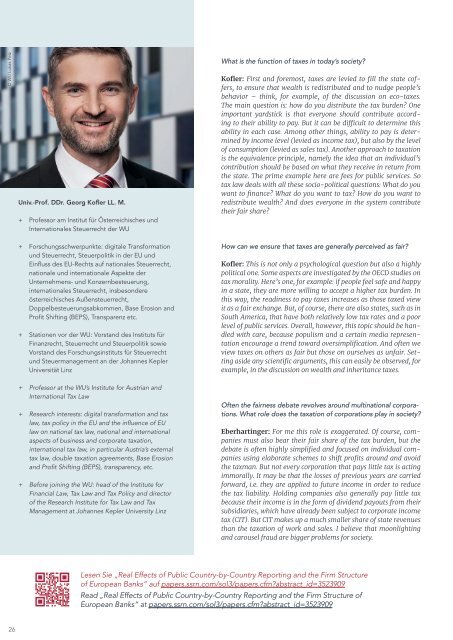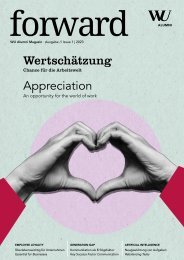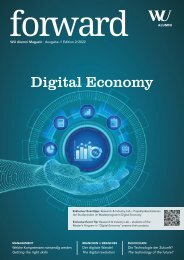forward – WU Alumni Magazin 2/2021
Die Ausgabe 2/2022 beschäftigt sich mit Steuern und Gerechtigkeit und damit verbundenen Themen wie dem Gender Pay Gap oder einer fairen Verteilung der Steuerlast. Außerdem gehen Expert/inn/en der Frage nach, was Pandemien kosten und wer die Coronarechnung Österreichs bezahlt. Die WU Wien sucht die Antworten auf die großen Fragen der Zeit und präsentiert die neu ins Leben gerufene WU Foundation zur Exzellenzsteigerung der Lehre und Forschung. Das WU Alumni Magazin forward erscheint zwei Mal pro Jahr. Mehr Infos unter www.wu-alumni.at
Die Ausgabe 2/2022 beschäftigt sich mit Steuern und Gerechtigkeit und damit verbundenen Themen wie dem Gender Pay Gap oder einer fairen Verteilung der Steuerlast.
Außerdem gehen Expert/inn/en der Frage nach, was Pandemien kosten und wer die Coronarechnung Österreichs bezahlt.
Die WU Wien sucht die Antworten auf die großen Fragen der Zeit und präsentiert die neu ins Leben gerufene WU Foundation zur Exzellenzsteigerung der Lehre und Forschung.
Das WU Alumni Magazin forward erscheint zwei Mal pro Jahr. Mehr Infos unter www.wu-alumni.at
Erfolgreiche ePaper selbst erstellen
Machen Sie aus Ihren PDF Publikationen ein blätterbares Flipbook mit unserer einzigartigen Google optimierten e-Paper Software.
© <strong>WU</strong> Lukas Pelz<br />
Univ.-Prof. DDr. Georg Kofler LL. M.<br />
+ Professor am Institut für Österreichisches und<br />
Internationales Steuerrecht der <strong>WU</strong><br />
+ Forschungsschwerpunkte: digitale Transformation<br />
und Steuerrecht, Steuerpolitik in der EU und<br />
Einfluss des EU-Rechts auf nationales Steuerrecht,<br />
nationale und internationale Aspekte der<br />
Unternehmens- und Konzernbesteuerung,<br />
internationales Steuerrecht, insbesondere<br />
österreichisches Außensteuerrecht,<br />
Doppelbesteuerungsabkommen, Base Erosion and<br />
Profit Shifting (BEPS), Transparenz etc.<br />
+ Stationen vor der <strong>WU</strong>: Vorstand des Instituts für<br />
Finanzrecht, Steuerrecht und Steuerpolitik sowie<br />
Vorstand des Forschungsinstituts für Steuerrecht<br />
und Steuermanagement an der Johannes Kepler<br />
Universität Linz<br />
What is the function of taxes in today’s society?<br />
Kofler: First and foremost, taxes are levied to fill the state coffers,<br />
to ensure that wealth is redistributed and to nudge people’s<br />
behavior <strong>–</strong> think, for example, of the discussion on eco-taxes.<br />
The main question is: how do you distribute the tax burden? One<br />
important yardstick is that everyone should contribute according<br />
to their ability to pay. But it can be difficult to determine this<br />
ability in each case. Among other things, ability to pay is determined<br />
by income level (levied as income tax), but also by the level<br />
of consumption (levied as sales tax). Another approach to taxation<br />
is the equivalence principle, namely the idea that an individual’s<br />
contribution should be based on what they receive in return from<br />
the state. The prime example here are fees for public services. So<br />
tax law deals with all these socio-political questions: What do you<br />
want to finance? What do you want to tax? How do you want to<br />
redistribute wealth? And does everyone in the system contribute<br />
their fair share?<br />
How can we ensure that taxes are generally perceived as fair?<br />
Kofler: This is not only a psychological question but also a highly<br />
political one. Some aspects are investigated by the OECD studies on<br />
tax morality. Here’s one, for example: if people feel safe and happy<br />
in a state, they are more willing to accept a higher tax burden. In<br />
this way, the readiness to pay taxes increases as those taxed view<br />
it as a fair exchange. But, of course, there are also states, such as in<br />
South America, that have both relatively low tax rates and a poor<br />
level of public services. Overall, however, this topic should be handled<br />
with care, because populism and a certain media representation<br />
encourage a trend toward oversimplification. And often we<br />
view taxes on others as fair but those on ourselves as unfair. Setting<br />
aside any scientific arguments, this can easily be observed, for<br />
example, in the discussion on wealth and inheritance taxes.<br />
+ Professor at the <strong>WU</strong>’s Institute for Austrian and<br />
International Tax Law<br />
+ Research interests: digital transformation and tax<br />
law, tax policy in the EU and the influence of EU<br />
law on national tax law, national and international<br />
aspects of business and corporate taxation,<br />
international tax law, in particular Austria’s external<br />
tax law, double taxation agreements, Base Erosion<br />
and Profit Shifting (BEPS), transparency, etc.<br />
+ Before joining the <strong>WU</strong>: head of the Institute for<br />
Financial Law, Tax Law and Tax Policy and director<br />
of the Research Institute for Tax Law and Tax<br />
Management at Johannes Kepler University Linz<br />
Often the fairness debate revolves around multinational corporations.<br />
What role does the taxation of corporations play in society?<br />
Eberhartinger: For me this role is exaggerated. Of course, companies<br />
must also bear their fair share of the tax burden, but the<br />
debate is often highly simplified and focused on individual companies<br />
using elaborate schemes to shift profits around and avoid<br />
the taxman. But not every corporation that pays little tax is acting<br />
immorally. It may be that the losses of previous years are carried<br />
<strong>forward</strong>, i.e. they are applied to future income in order to reduce<br />
the tax liability. Holding companies also generally pay little tax<br />
because their income is in the form of dividend payouts from their<br />
subsidiaries, which have already been subject to corporate income<br />
tax (CIT). But CIT makes up a much smaller share of state revenues<br />
than the taxation of work and sales. I believe that moonlighting<br />
and carousel fraud are bigger problems for society.<br />
Lesen Sie „Real Effects of Public Country-by-Country Reporting and the Firm Structure<br />
of European Banks“ auf papers.ssrn.com/sol3/papers.cfm?abstract_id=3523909<br />
Read „Real Effects of Public Country-by-Country Reporting and the Firm Structure of<br />
European Banks“ at papers.ssrn.com/sol3/papers.cfm?abstract_id=3523909<br />
26<br />
88391_<strong>WU</strong>_<strong>Alumni</strong>_Forward_2_<strong>2021</strong>_ICv2.indd 26 30.08.21 13:31




